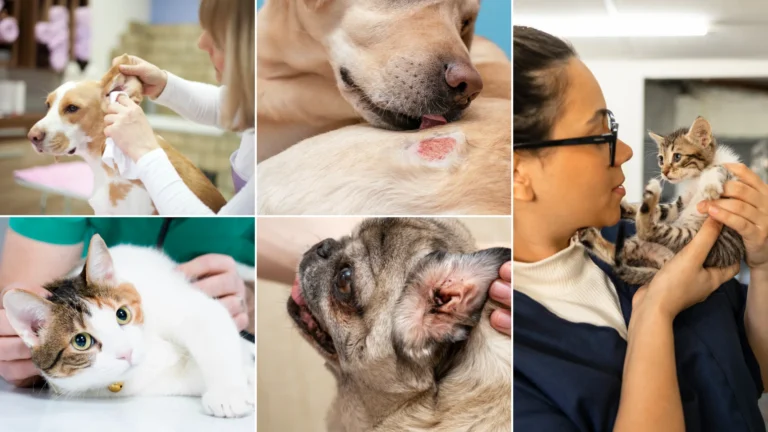My pet tested positive for heartworm disease. What does that mean?
A positive heartworm test means that your dog has worms living within the heart and the large blood vessels between the heart and the lungs.
How soon should my pet begin treatment after a positive heartworm test?
It is important that your dog starts treatment for heartworms as soon as you possibly can after a positive heartworm test. It is not an emergency that you have to do it the very next day. But the longer the worms stay in there, the more damage they cause in the heart and lungs. So it’s better to start treatment as soon as you can.
What does heartworm treatment at Emancipet look like?
Emancipet follows the American Heartworm Society guidelines for treating heartworms in dogs.
The first visit you would have here at Emancipet would be a heartworm evaluation. This is a visit where blood is taken, a heartworm test is re-run to verify a positive, and you’re sent home with medications to give your pet. One, an antibiotic to help weaken the worms, and two, heartworm prevention to prevent any new worms from getting started
The next visit is your first heartworm injection. The pet will stay in the hospital for the day. They will get an injection of drug in the lumbar muscles of their back, and then they stay with us for a couple hours afterwards to monitor for any complications. On this visit, blood work also is run to check liver and kidney function to make sure that the internal organs are fine to metabolize the drugs we’re giving.
The third visit is two months later, and it is the second injection. It works about the same as the first. They come in and they will give the injection in the lumbar muscles and they go home that afternoon. They come back the very next day, so that’s two days in a row, and they get their third injection on that second visit there.
After that, they will go home and their next visit will be approximately a month later. We’ll draw blood again and check for any baby heartworms. And then come back about eight months after the final treatment and do another test for the adult heartworms at that time. There is some leeway in between the first and second injection. So we can go a little bit longer than the month in between, but it is very, very, very important those last two injections are 24 hours apart. If you come the first day and you don’t come the second day, you run the risk of possibly having a positive heartworm test.
What happens during my dog’s heartworm treatment visit?
When you arrive for your heartworm treatments, the dog is checked in and placed in a kennel in our facility. For a first injection, blood work is drawn and we check the liver and kidney function to make sure everything’s okay to put those drugs in there. The dog is then given an injection into the lumbar muscles along the back, and then replaced in the kennel and monitored for at least two hours after the injection for any signs of complications, and then at that point they’re able to go home. They are sent home with medicines for pain and inflammation to be taken at home.
Do I need to give my pet heartworm prevention during or after treatment?
Yes, it is very important to start heartworm prevention at the time they are diagnosed and then to continue heartworm prevention for the rest of your pet’s life.
How can I help my pet stay calm for the required kennel rest?
It is very important to keep your pet calm after these injections. While the worms are dying off, Excitement or high heart rate can sometimes cause a piece of dead worm to break off and lodge in the lungs. So it’s going to be very important to keep your pet calm.
If you start ahead of time crate training your pet so that they are comfortable staying in a crate for longer periods of time, that is the best method. Don’t let your dogs run around the backyard playing with your other dogs. Don’t take your dog to the dog park and let them run around and play with the others.
If your dog loves to play throw the ball, don’t do that for the couple months they’re needing rest. If there are things that get your dog real excited around the house, jumping up and down on the couch, running around when the doorbell rings, try and limit those things. Turn the doorbell off for two months if you need to – Anything you can do to keep your dog calm and relaxed during this two month period. For very high energy dogs or dogs that are just not going to relax very well, there is medication available to help calm your dog down and please ask for it at your treatment time.
How does heartworm treatment affect spaying and neutering? Should I spay or neuter my pet before treatment starts?
For most young healthy dogs, newly diagnosed with heartworms, it is probably better to go ahead and do surgery and do the spay and neuter before heartworm treatment starts. Sometimes spaying and neutering can help with activity restriction.
It is important that female dogs do not get bred during heartworm treatment. The drugs we are using are not good for the babies and their development. And the stress of giving birth for the female is very high and not good for them after heartworm injections. We usually do not recommend doing anesthesia on dogs undergoing heartworm treatment because of the stress and the chances for complications. If we do, in emergency situations, have to put them under anesthesia, then it will be done, but usually just routinely we don’t want to do that.
Although heartworm treatment is confusing, it is a necessary life saving procedure for dogs that test positive for heartworm.
Emancipet’s First Research Study
Did you know Emancipet published its first research study, which focused on the treatment of heartworm disease in dogs, in the scientific journal Parasites and Vectors?
Conducted in collaboration with the ASPCA, the research study took place from February 2020 through December 2021 at two high-volume Emancipet clinics in Austin and Houston, Texas. The study was designed to evaluate the effectiveness and safety of heartworm treatment protocols based on the American Heartworm Society Guidelines and optimized for high-volume, outpatient clinic settings. Overall, the study findings demonstrate that by implementing protocols like this, veterinary care providers can offer services such as heartworm treatment in outpatient settings, making it lower-cost and more accessible to a broader range of people with pets.
The co-authors of the study are:
- Meghan Still, Ph.D, Emancipet’s Chief Finance and Data Officer
- Dr. Dana Tedesco
- Dr. Chrsitina Hawkins
- Dr. Holly Putnam, Emancipet’s Chief Medical Officer
The publication of the full study can be found here: https://parasitesandvectors.biomedcentral.com/articles/10.1186/s13071-024-06153-4.
For more information about Emancipet and its research initiatives, visit https://emancipet.org/research/.
Emancipet saw 1,985 patients in 2023 at its Norwood Clinic in Austin, Texas and its Wayside Clinic in Houston, Texas for this high volume, low-cost accessible heartworm treatment. For additional details about heartworm treatment at Emancipet, please visit: https://emancipet.org/services/heartworm-treatment/.




